June. Winter in the southern hemisphere. The year 2011.
A man walks into the bar – yes I know, I use it too often.
But there’s a reason. Besides the fact we’re often in the bar, before you say it.
This man, dressed in hunter’s green, deposits a plastic carrier bag full of stone age tools on the table.
Handaxes.
And someone – someone close to me – just has to know where they’ve been found.
So we make an early start.
Driving in the chill of early morning, sweatshirts on, vents closed.
Sounds of the night fading, sounds of the morning winding up, all-but drowned-out by the diesel engine.
Five hours later, a tomato and cheese sandwich in my hand – and it’s warm, not to say hot.
OK, it’s hot.
And time to venture off the tarmac.
Into the unknown.
The dirt road’s underlain with rocks that in places are almost impossible to straddle with four wheels. So we drive at an angle through minor chasms, churning orange dust as we go.
Beside the track are villages. The huts are a different shape here. It all feels unfamiliar – and I begin to feel uncomfortable.
We’re heading for a hunters’ camp, down by the river. But the afternoon is waning – and still we’re going uphill.
We come to a fork.
Sven said there’d be a sign when we came to a fork in the track. Then it’s straight on all the way.
There is no sign.
We stop and I ask a woman. She waves an arm at the left fork. We take it.
The GPS seems at odds with where we’re going. Or do I mean the other way around?
The warmth is beginning to dissipate. Not a good sign. We need to arrive, soon. Before dusk settles into night.
We drive, and drive, but still we’re going straight – if not up – and we should be going down.
Ominous signs – not the kind we want – begin to worry us both.
Targets.
This is hunting territory. Professional hunting territory.
The combination of rifles and wild animals is not appealing. And it’s an empty place. No villages. No people.
Pristine huts. Built for effect? Plainly not lived-in. I feel as if we’ve strayed into an episode of ‘The Prisoner’, Zambia style.
We take a chance and turn off the trail but we’re still not heading down and we turn back. Drive a bit further, then try another turn.
Now I’m feeling scared.
I scare easily. But then I’m used to being scared in this scary wonderful country, so I hold my tongue and try not to show my fear.
Then the miracle we’ve been looking for happens. A man appears on a motorbike. Stops us.
Relief makes me happy. I smile a big smile at him and he smiles a big smile back.
He’s on his way to our camp.
Correction, he was. Now he’s passed on his errand to us – a message that someone has died – and he’s going home.
So we ask the way. He smiles.
I resort to pointing. That way?
Yes, he grins.
A worm of doubt wriggles in my brain. Just to be sure I point the other way.
That way?
Yes, he grins.
Every way is the way. And we don’t know which way he was going before he heard us and came to find us.
I can understand why people shout when they’re trying to be understood – but there’s no point.
Miracle-man leaves.
It’s really growing dark now. And we’re lost.
We could roll up the windows, sleep in the car, I say, hoping he won’t agree.
He doesn’t. But he’s not yet ready to abandon all hope.
The sun’s gone down, the last glimmers piercing the dense woods around us, when he turns around. We drive, anxious, the feel of it in his driving. Not really sure if we’re going to find our way back.
Eventually, when no hint of light remains in the air, we reach the fork without any sign.
A relief.
But by night, the track that was a nuisance becomes a nightmare, driving down hill worse than driving up.
We’re tense. It’s been nine hours. And we haven’t stopped at all.
I try the cellphone that’s been so useless for so long. At last there’s a weak signal and I phone the only reachable place we know of where we could spend the night.
It’s full.
We drive on.
The sides of the track are higher now, rising above us, darkening the route still more.
With an almighty clang we hit rock and jolt to a halt.
Archaeo-Man’s façade cracks.
I’m sorry. I’m so, so, sorry …
It’s all right, I say. Try reverse, it’s probably nothing.
He reverses. Get outs, inspects the damage.
It’s minor. We’re fine.
We hug, sharing our fear at last. A fear shared isn’t halved, but we both feel better.
Then the cellphone startles me by ringing.
Bridge Camp. Someone’s cancelled. Do we want a room?
Do we!
Tarmac regained, we drive slowly through the cool of the night, windows open to let in the freedom. Drive over the great Luangwa Bridge, marvelling at the river way below, the stars way above.
The room has two beds with sheets. The loo’s in a shack down the track. The screens have gaping holes. But there are mosquito nets.
It’s been nearly thirteen hours since we set off and Archaeo-Man’s been driving non-stop. I suggest biscuits, cheese, a tumbler of wine. He shakes his head.
Just sleep.
He sits and stares. Stunned. Or dazed.
I open the Provita biscuits, pull out a slice of cheese. Pour a plastic tumbler of wine.
He smiles, a ghost of a smile. I think we both want to cry, but don’t.
We sleep in our clothes. Not a great night’s sleep. At five am – after the loo door’s banged many times – fifty or so motorcyclists rev up and leave.
I’ve not been to Bridge Camp before. The beauty of the view darkens as my gaze grazes the slave ship anchor hanging in the way.
An all too solid reminder of the people who were sold – and bought – down this particular river.
But today we’re drinking tea. Eating bacon, eggs, and toast. There’s even fruit.
Last night’s just a nightmare – we’re awake and the sun is shining.
I wonder if we’re going to try again.
He smiles, just.
Some other time, eh?
* Robert Louis Stevenson:
‘To travel hopefully is a better thing than to arrive,
and the true success is to labour.’

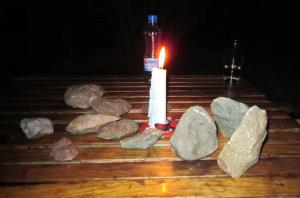
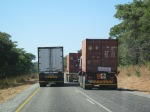
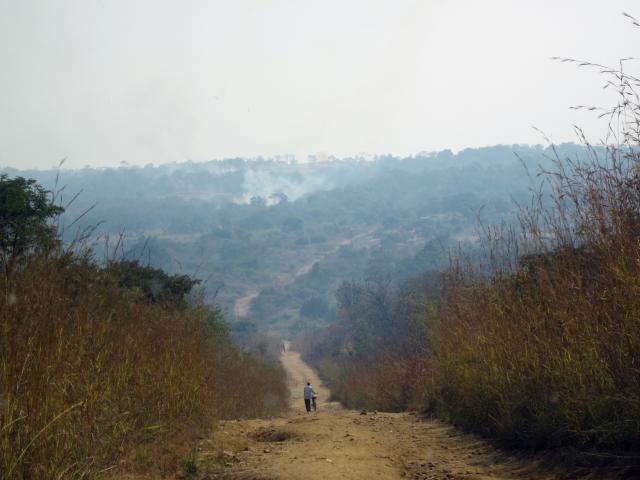
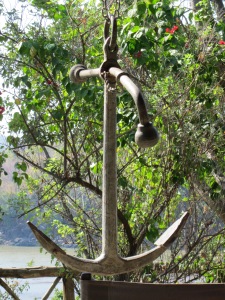
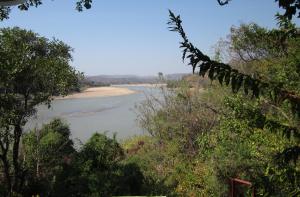

The tension! Ouf! I know the feeling. I love the photo of the “track”. Just to let you know, no response necessary.
LikeLike
OK I won’t reply then! 😉
LikeLike
P.S. Again. Dust in the distance, someone coming your way.
LikeLike